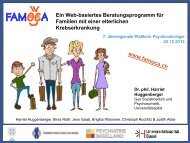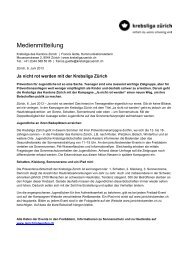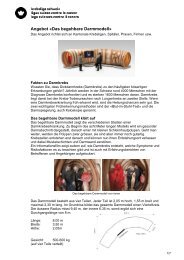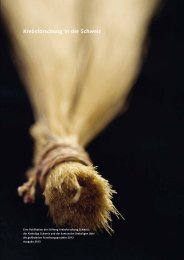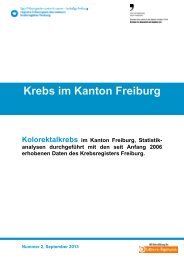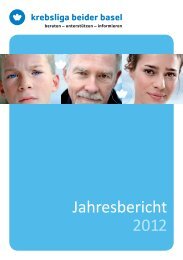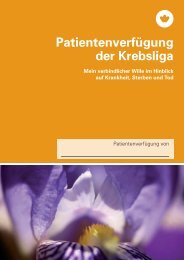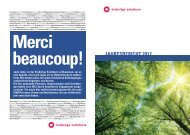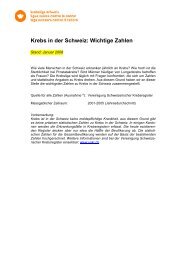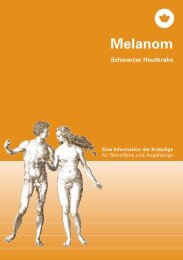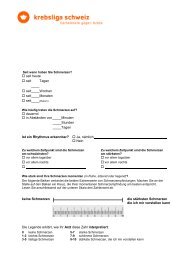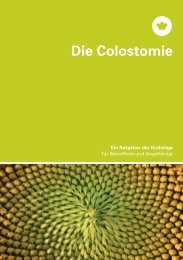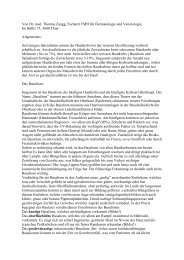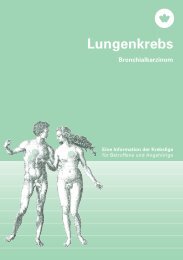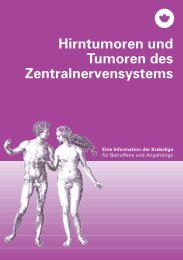Cancer Research in Switzerland - Krebsliga Schweiz
Cancer Research in Switzerland - Krebsliga Schweiz
Cancer Research in Switzerland - Krebsliga Schweiz
Create successful ePaper yourself
Turn your PDF publications into a flip-book with our unique Google optimized e-Paper software.
180<br />
With<strong>in</strong> the patient group, level of fatigue was strongly associated<br />
with anxiety, depression, sleep quality, and pa<strong>in</strong><br />
and dyspnea compla<strong>in</strong>ts. However, fatigue was weakly<br />
and <strong>in</strong>consistently related to physiological or medical risk<br />
parameters.<br />
Conclusions<br />
Cardiac autonomic function<strong>in</strong>g may be impaired among<br />
HSCT survivors, but patterns of daytime activity are similar<br />
to healthy controls. HSCT fatigue appears to be related<br />
more to extent of perceived symptoms than to concurrent<br />
physiological function<strong>in</strong>g or medical risk <strong>in</strong>dices. The f<strong>in</strong>d<strong>in</strong>gs<br />
suggest that psychological processes related to symptom<br />
perception may be importantly <strong>in</strong>volved <strong>in</strong> the development<br />
and ma<strong>in</strong>tenance of fatigue. These f<strong>in</strong>d<strong>in</strong>gs may<br />
contribute to understand<strong>in</strong>g and treat<strong>in</strong>g fatigue <strong>in</strong> HSCT<br />
survivors.<br />
Project coord<strong>in</strong>ator<br />
Prof. Dr. Alexander Kiss<br />
Abteilung Psychosomatik<br />
Universitätsspital Basel<br />
Petersgraben 4<br />
CH-4031 Basel<br />
Contact:<br />
Dr. Paul Grossmann<br />
Phone +41 (0)61 265 22 15<br />
grossmanp@uhbs.ch<br />
Lehr Hans-Anton | Biomedical research on human<br />
tissues: In the twilight zone between autonomy and<br />
data protection. What do health professionals, patients<br />
and lay persons th<strong>in</strong>k about issues of consent and<br />
transparency <strong>in</strong> medical research, teach<strong>in</strong>g, and quality<br />
control? (OCS 02209-02-2008)<br />
Scientific research is of key importance <strong>in</strong> the development<br />
of knowledge on people and their health. This <strong>in</strong>cludes<br />
not only conduct<strong>in</strong>g cl<strong>in</strong>ical research on <strong>in</strong>dividuals<br />
but also research us<strong>in</strong>g human tissues. These tissues,<br />
taken <strong>in</strong> the course of treatment, may be used for research.<br />
Although this is a common practice, progress <strong>in</strong><br />
medical science constantly br<strong>in</strong>gs up new issues with regard<br />
their use. Advances <strong>in</strong> this field provide new knowledge<br />
and possibilities for use of the tissues and the data<br />
thus generated, but the advances also raise new ethical<br />
problems, such as the possibility to establish a direct l<strong>in</strong>k<br />
between the human tissue and the personal characteristics<br />
of the patient. In view of these developments, it is imperative<br />
to understand how the public perceives the use<br />
of human tissues for research. The present study, conducted<br />
jo<strong>in</strong>tly by the University Institute of Pathology<br />
(IUP) and the University Institute of Social and Preventive<br />
Medic<strong>in</strong>e <strong>in</strong> Lausanne (IUMSP), seeks to analyze the perceptions<br />
and attitudes of different groups <strong>in</strong> the Swiss<br />
population regard<strong>in</strong>g the conservation and use of human<br />
tissues for research.<br />
This research project <strong>in</strong>cludes the follow<strong>in</strong>g <strong>in</strong>vestigations:<br />
a systematic review of the literature, an analysis of<br />
the legal framework surround<strong>in</strong>g human tissue research,<br />
consultation of experts <strong>in</strong> the field, a qualitative study of<br />
the perceptions and expectations of the general public<br />
and health professionals regard<strong>in</strong>g the use of human tissues<br />
for research and the development and test<strong>in</strong>g of an<br />
<strong>in</strong>strument for a general population survey.<br />
Analysis of the scientific literature <strong>in</strong>dicates that current<br />
debate is on the follow<strong>in</strong>g questions: 1) What <strong>in</strong>formation<br />
should be given to patients so that they are able to make<br />
an <strong>in</strong>formed choice? 2) What k<strong>in</strong>d of consent should be<br />
obta<strong>in</strong>ed: broad consent or consent to a specific study;<br />
explicit or implicit consent? The literature analysis revealed<br />
that <strong>in</strong> some countries, studies have been conducted<br />
on perceptions and wishes of the population with<br />
regard to consent. It is to be noted that the studies did not<br />
<strong>in</strong>vestigate public expectations regard<strong>in</strong>g what <strong>in</strong>formation<br />
should be given. The ma<strong>in</strong> results were the follow<strong>in</strong>g:<br />
a) the general public and patients wish to have the opportunity<br />
to give or withhold consent to use of their tissues;<br />
b) a large majority of persons <strong>in</strong>terviewed would give consent<br />
if asked; c) of the different forms of consent possible,<br />
general consent is favoured by most.<br />
The literature review and the expert <strong>in</strong>terviews allowed us<br />
to identify the ma<strong>in</strong> issues at stake and to def<strong>in</strong>e the<br />
themes to be discussed <strong>in</strong> the focus groups. To facilitate<br />
debate, vignettes describ<strong>in</strong>g fictitious situations were presented<br />
to the participants. The op<strong>in</strong>ions expressed <strong>in</strong> the<br />
focus groups, conducted <strong>in</strong> the Canton of Vaud, <strong>in</strong>dicate<br />
that certa<strong>in</strong> professionals fear that the need to obta<strong>in</strong><br />
consent from patients to use of their tissues could act as<br />
a barrier to research. However, the general public and patients<br />
are generally favourable to research. On the other<br />
hand, they do express the wish to be explicitly consulted<br />
and <strong>in</strong>formed of the possibility of such use, perceived<br />
rather as status-enhanc<strong>in</strong>g, or, <strong>in</strong> severe cases, as a means<br />
to make sense of one’s illness.<br />
Patients are ready to consent to use of their tissues for research<br />
on the condition that they are considered partners<br />
by health professionals. In this context, consent is seen as<br />
a means of ensur<strong>in</strong>g that they have been <strong>in</strong>formed rather<br />
than as an opportunity to withhold consent.<br />
Project coord<strong>in</strong>ator<br />
Prof. Dr Hans-Anton Lehr<br />
Institut universitaire de pathologie de Lausanne<br />
Centre hospitalier universitaire vaudois (CHUV)<br />
Rue du Bugnon 25<br />
CH-1011 Lausanne<br />
Phone +41 (0)21 314 71 20<br />
Fax +41 (0)21 314 72 05<br />
hans-anton.lehr@chuv.ch<br />
Rüesch Peter | Information needs of patients with<br />
curable adenocarc<strong>in</strong>oma of the prostate and professionals’<br />
op<strong>in</strong>ions: An <strong>in</strong>ternational study (INEPAP)<br />
(KLS 02198-02-2008)<br />
Objectives<br />
Curable cancer of the prostate can be treated by diverse<br />
methods of therapy, each of them be<strong>in</strong>g def<strong>in</strong>ed by specific<br />
pros and cons. Therefore, treatment decision is challeng<strong>in</strong>g,<br />
because patients have to consider a lot of data to<br />
understand the practical consequences of different treatment<br />
options. However, research <strong>in</strong>dicates that men with<br />
prostate cancer are frequently not satisfied with the <strong>in</strong>formation<br />
offered: Many report not hav<strong>in</strong>g received sufficient<br />
data; others compla<strong>in</strong> about redundant, <strong>in</strong>apt or little<br />
<strong>in</strong>telligible <strong>in</strong>formation. Therefore, it was the purpose



